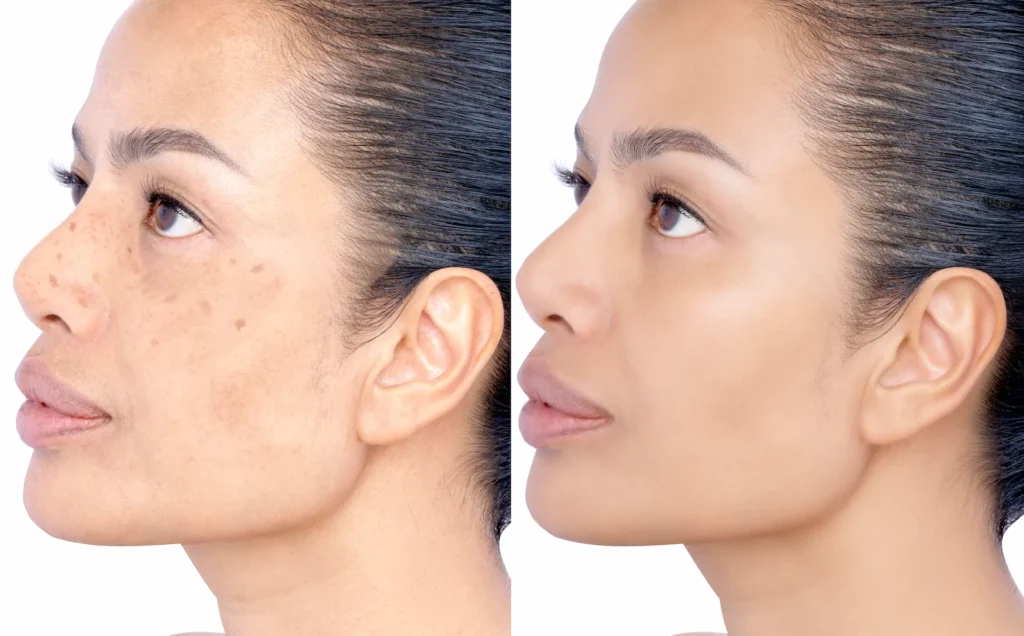Melasma is a chronic skin condition characterized by dark, blotchy pigmentation—especially on the cheeks, forehead, upper lip, and chin. Although the exact cause is multifactorial (UV exposure, hormonal changes, inflammation, etc.), oxidative stress plays a significant role. That’s why Vitamin C, a powerful antioxidant, is a key player in many melasma treatment plans.
In South Korea—renowned for its advanced skincare science—dermatologists and aesthetic surgeons frequently recommend Vitamin C as part of a multi-step treatment protocol. Whether it’s applied topically, injected via skin boosters, or combined with laser therapy, Korean experts view Vitamin C as an essential tool in fighting pigmentation disorders like melasma.
Let’s explore exactly how Vitamin C works for melasma, how it’s used in Korean clinics, and what top Korean professionals have to say.
🧪 How Does Vitamin C Help Treat Melasma?
Vitamin C (ascorbic acid) plays a multi-functional role in treating melasma:
🔬 1. Inhibits Melanin Production
Vitamin C reduces the activity of tyrosinase, the enzyme responsible for melanin synthesis. This prevents new pigmentation from forming and gradually fades existing spots.
🛡 2. Antioxidant Protection
It neutralizes free radicals caused by UV exposure, pollution, and inflammation—all of which can trigger or worsen melasma.
✨ 3. Brightening and Skin Tone Evening
Vitamin C improves overall skin clarity and helps lighten hyperpigmentation by promoting healthy skin turnover.
💧 4. Boosts Collagen Production
It stimulates collagen synthesis, which improves skin texture and reduces signs of photoaging—common in melasma-prone skin.
🇰🇷 What Korean Dermatologists Say About Vitamin C for Melasma
Korean dermatologists emphasize that Vitamin C alone isn’t a miracle cure, but it plays a vital supportive role in combination therapies. Here’s what some leading professionals in Korea recommend:
🗣 Dr. Lee Joo-Hwan, Dermatologist at Gangnam Skin Clinic
“We don’t rely on Vitamin C as a standalone solution for melasma. However, when paired with lasers or tranexamic acid, it enhances results, reduces inflammation, and supports barrier recovery.”
🗣 Dr. Kim Min-Jung, Cosmetic Surgeon at Apgujeong Aesthetic Center
“High-potency Vitamin C serums—especially those stabilized with ferulic acid or glutathione—help patients maintain laser results and prevent new pigmentation between treatments.”
🗣 Dr. Choi Eun-Seo, Anti-Aging Specialist
“Vitamin C is a skin-brightening powerhouse. But in Korea, we prefer derivatives like magnesium ascorbyl phosphate or sodium ascorbyl phosphate, which are more stable and less irritating—perfect for sensitive melasma skin.”
🧴 How Korean Clinics Use Vitamin C in Melasma Treatment
✅ 1. Topical Serums
Most Korean clinics recommend daily Vitamin C serums, especially in the morning.
Preferred types:
- Ascorbyl glucoside (stable and non-irritating)
- Sodium ascorbyl phosphate
- Vitamin C + E + ferulic acid combo (synergistic antioxidant effect)
🧴 Popular Korean Brands:
- Tiam My Signature C Source
- Some By Mi Galactomyces Pure Vitamin C Glow Serum
- Klairs Freshly Juiced Vitamin Drop
✅ 2. Vitamin C Skin Boosters (Injectables)
Korean dermatology clinics often use Vitamin C injections as part of mesotherapy or skin booster treatments. These deliver Vitamin C directly into the dermis, bypassing the skin barrier.
Benefits:
- Immediate antioxidant effect
- Visible skin brightening after just a few sessions
- Often combined with glutathione or tranexamic acid for melasma
🧪 Clinic Packages May Include:
- Vitamin C + Glutathione drips
- Meso-cocktails with Vitamin C, peptides, and TXA
✅ 3. Vitamin C Post-Laser Recovery
After laser treatments like Q-switched Nd:YAG or Pico laser, Korean surgeons recommend applying Vitamin C serums to:
- Calm inflammation
- Reduce post-laser hyperpigmentation (PIH)
- Support healing
💡 Korean Insight: Doctors advise waiting 1–2 days post-laser before applying Vitamin C to avoid irritation.
✅ 4. Oral Vitamin C Supplements
Though less potent than topical or injected forms, oral Vitamin C is often recommended in Korean melasma protocols to:
- Enhance skin immunity
- Support antioxidant defenses
- Complement oral tranexamic acid or glutathione
🧴 Dosage: 500–1,000 mg per day, often paired with Vitamin E for better absorption.
💡 Combining Vitamin C with Other Melasma Treatments
| Treatment Type | Role of Vitamin C |
|---|---|
| Laser Toning | Enhances antioxidant recovery, reduces rebound pigment |
| Tranexamic Acid | Boosts anti-inflammatory effects |
| Retinoids or AHAs | Balances irritation and speeds up visible results |
| Sunblock (AM routine) | Boosts SPF efficacy when layered under sunscreen |
| Microneedling / MTS | Increases penetration when used post-procedure |
Korean clinics often include Vitamin C in multi-treatment packages because of its synergistic effects with other active ingredients.
⚠️ Caution: Vitamin C Isn’t for Everyone
Korean dermatologists caution that:
- High concentrations (>20%) can cause irritation in sensitive or inflamed melasma skin.
- Vitamin C should not be mixed directly with strong acids like AHA/BHA unless formulated that way.
- Store Vitamin C in dark, airtight containers to avoid oxidation.
🧴 Morning Routine with Vitamin C (Korean Clinic Style)
| Step | Product Example | Purpose |
|---|---|---|
| Cleanser | Low-pH gel cleanser | Prepares skin |
| Toner | Mild hydrating toner (no alcohol) | pH balance, hydration |
| Serum | Vitamin C serum (e.g., ascorbyl glucoside 10%) | Brightening, antioxidant |
| Moisturizer | Ceramide-rich cream | Barrier repair |
| Sunscreen | SPF 50+ PA++++ with HEV/IR protection | Blocks UV-induced melanin |
📈 Summary: The Vitamin C Advantage in Korean Melasma Treatment
| Benefit | Korean Clinic Insight |
|---|---|
| Fades pigment gradually | Especially when used with TXA or lasers |
| Protects against UV and free radicals | Part of every morning routine in Korea |
| Stimulates collagen | Improves skin elasticity post-laser |
| Safe for long-term use | Preferred in derivative form for stability |
| Works best in combination | Always paired with sunscreen and calming agents |
🌸 Final Thoughts
Vitamin C is a cornerstone ingredient in Korean melasma protocols—not because it works overnight, but because it supports skin health, fades pigment gently, and enhances the results of clinical treatments. Whether used topically, injected, or taken orally, it’s one of the most dermatologist-recommended tools for melasma management.
If you’re considering treatment in Korea or building a skincare routine for melasma at home, don’t underestimate the role of this antioxidant powerhouse. Just be sure to use the right form, at the right strength, in the right combination.



